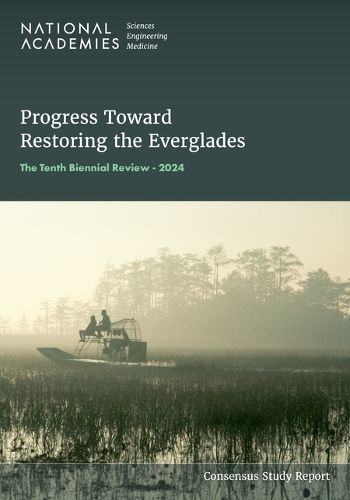Progress Toward Restoring the Everglades
National Academies of Sciences, Engineering, and Medicine, Division on Earth and Life Studies, Water Science and Technology Board, Committee on Independent Scientific Review of Everglades Restoration Progress

Progress Toward Restoring the Everglades
National Academies of Sciences, Engineering, and Medicine, Division on Earth and Life Studies, Water Science and Technology Board, Committee on Independent Scientific Review of Everglades Restoration Progress
The Florida Everglades is a treasured ecosystem, but the water quality, quantity, flow, and distribution have been dramatically degraded by drainage and infrastructure development during the past century. A joint effort launched by the State and federal government in 2000, the Comprehensive Everglades Restoration Plan (CERP) seeks to reverse the decline of the ecosystem. The National Academies have provided a biennial review of CERP since 2004. This tenth biennial report in the series highlights significant recent restoration progress and offers guidance in three areas: applying Indigenous Knowledge in project planning, using modeling tools for understanding the effects of climate change on the CERP, and strengthening adaptive management for CERP decision making.
Thanks to record state and federal investments in recent years, the pace of restoration implementation has reached historic levels and sizeable restoration benefits have been achieved. However, information on natural system restoration progress relative to CERP expectations continues to be difficult to find and interpret. The report recommends modeling tools be applied to anticipate the effects of climate change, including temperature and precipitation, on CERP outcomes and to inform planning and management. Moving forward, consistent and meaningful engagement between CERP agencies and tribal nations is necessary to create a partnership where Indigenous Knowledge can be considered and applied in restoration decision-making. Building expertise and a culture of adaptive management can help ensure continued restoration progress amid uncertainties and improve restoration outcomes through the incorporation of new information.
Table of Contents
Front Matter Summary 1 Introduction 2 Restoration Progress 3 Applying Indigenous Knowledge in the Comprehensive Everglades Restoration Plan 4 Application of Tools to Evaluate the Effects of Climate Change 5 Adaptive Management and Use of New Information in Decision Making References Appendix A: The Restoration Plan in Context Appendix B: The National Academies of Sciences, Engineering, and Medicine Everglades Reports Appendix C: Biographical Sketches of Committee Members and Staff
Order online and we’ll ship when available (1 April 2025)
Our stock data is updated periodically, and availability may change throughout the day for in-demand items. Please call the relevant shop for the most current stock information. Prices are subject to change without notice.
Sign in or become a Readings Member to add this title to a wishlist.


